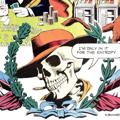A Cask of Troutwine reviewed Consider Phlebas by Iain M. Banks (Culture, #1)
None
4 stars
Every time someone talks about the Culture series they always say to skip this one and start with the next, The Player of Games. Obviously I heard a lot of the reasons for why, the gap between when they were written, the stylistic and quality differences as Iain M. Banks grew as a writer between this book and the next, etc., but it struck me that to skip to the next ones because they're better would simply amplify whatever negative qualities this one had, which wouldn't be fair to judge this book by.
And honestly, I think people might judge this book a little too harshly. It doesn't reinvent the wheel, and hits a lot of the space opera tropes, but its engaging enough despite the odd clunky passage or unexpected and awkward POV shifts. It was fun seeing Banks draw from the Peloponessian War and ancient Greek stories …
Every time someone talks about the Culture series they always say to skip this one and start with the next, The Player of Games. Obviously I heard a lot of the reasons for why, the gap between when they were written, the stylistic and quality differences as Iain M. Banks grew as a writer between this book and the next, etc., but it struck me that to skip to the next ones because they're better would simply amplify whatever negative qualities this one had, which wouldn't be fair to judge this book by.
And honestly, I think people might judge this book a little too harshly. It doesn't reinvent the wheel, and hits a lot of the space opera tropes, but its engaging enough despite the odd clunky passage or unexpected and awkward POV shifts. It was fun seeing Banks draw from the Peloponessian War and ancient Greek stories to give us a recognizable narrative (Horza is thrown from a ship and rescued by pirates, ends up being press-ganged into various raids on ancient temples and ships, has to escape from various dangers by his wits and skills, etc) but on a scale far vaster than anything possible on Earth.
However I can understand that the books constant theme that all ambitions end up for naught can be stultifying, with it constantly hitting you over the head with every narrative arc ending in some form of failure. For me personally however, I thought it was interesting to see where the book went next and the cast reacting to the worsening situation and trying to justify continuing. I also thought Horza was an engaging protagonist given how convinced he is of his own motivations for hating the Culture, while engaging in casual cruelty and self-serving actions for his own convenience. It was also interesting to be introduced to the series main book unifying civilization, The Culture, through the eyes of someone who hates it and is actively seeking to curtail their influence.
I genuinely think this book is a bit unjustly looked over in favor of the later books in the series, and I think people should give it a shot instead of just skipping to the next one.















